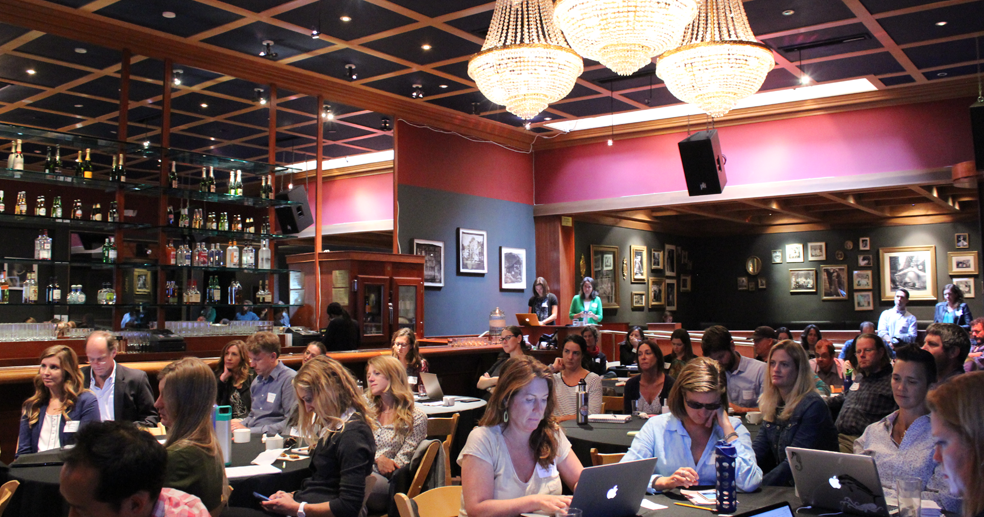
An unlikely blend of fishers, producers, technology experts, seafood sellers, and chefs convened September 15th at the Empire Room in San Francisco for Industry Lab, an invite-only day of brainstorming, in-depth discussion, and collaborative problem-solving around our favorite topic—fish. Attendees shared the common goal of a deep commitment to seafood sustainability and a desire to rethink current systems even though their diversity in background meant many were new to each other.
The day featured three panels that sparked discussion around traceability, seasonality, and the complexity of relationships in the seafood supply chain. Attendees collaborated during a World Café work session, enjoyed a local seafood lunch from Fine and Rare, and got to hear South Bay Wild’s own Rob Seitz recite his latest fish poem.
As attendees moved through the room, scribbling down ideas and sharing context from their own experiences, a central theme emerged. Transparency in the supply chain begins with asking questions, it strengthens when we attach stories to fish, and it thrives when we verify those stories using a common vocabulary and set of standards to fact check each fish’s journey. Understanding storied fish is just the beginning.
Gordon Drysdale, Culinary Director at Scoma’s Restaurant in San Francisco, talked about his role as a storyteller and fish buyer who helps to connect fishers, chefs, and seafood lovers. “I realized that I could better the lives of fishers by buying the catch directly and paying more than the dock price,” he said. “I could educate the public on where their fish came from which would also better the story for the customers. And for fishermen, it’s a great feeling to know that the fish they caught will be served 30 feet away.”
Located on the Fisherman’s Wharf boardwalk, Scoma’s serves sustainable seafood to thousands of tourists each year and is 100% compliant with the Monterey Bay Aquarium Seafood Watch Program. Scoma’s is the first tourist hotspot on the wharf to step up to the sustainability challenge.
Mariah Boyle, the traceability division director at FishWise, raised a storytelling challenge that her team is working to solve. “We [those companies working on seafood traceability] all speak different languages,” she said. “This makes it difficult to solve these problems together.” Her comment sparked a discussion about the need for a common language, one that will allow communication, standard setting, and education across all links of the supply chain.
Accountability surfaced as another major need across the board, from fisher to seller to chef. As Crystal Sanders of Fish Revolution has experienced time and again, asking fish sellers to trace the origins of their fish can be difficult. She emphasized the need for education in the middle of the supply chain and the need to arm those who are neither catching fish nor cooking it with enough information to support traceability. Her work with the Future of Fish on the Smart Catch program is helping to prove the power of good fish stories to drive good business for restaurants. The program aims to celebrate chefs who serve sustainable fish while encouraging others to consider making their seafood menus more sustainable.
As quickly as they can identify barriers, major players in the industry are also working toward solutions. The rise of social media means that fishers can share the details of their livelihoods with potential customers before the boat even reaches the dock. This works for some, like Gary Root, the founder of Same Day Seafood who markets fresh, responsibly caught seafood in the Bay Area. “We’re in the seafood entertainment business,” he said. “When you’re entertaining people, you can slip educational messages in.”
There’s no doubt that story plays a part in fishing; now it’s up to all of us to decide who tells these stories, how we share them, and how stories help all players in the supply chain to work toward practices that ensure the survival of species in oceans everywhere.
“The future generation needs to be a different type of fisherman,” said Rob Seitz. “One who gets out on the water to fish but also tells their story in port and over social media.”
The group finished the day with oysters from Seattle-based Taylor Shellfish and libations from the Empire Room. Here are a few highlights from our happy hour conversations.
“I am excited to see a lot of really intelligent people in the industry. This room is so vibrant and intellectual.” Gary Root, President, Same Day Seafood
“This type of event really takes you out of the box. Now I can put a face to all of these people I’ve been talking about. We’re all ultimately working toward the same goal.” Eugenia Mazal, Operations Manager, Pelagic Data Systems
“It’s smaller groups like these that really get things done.” Tiffani Seitz, South Bay Wild
Read more about our Sustainable Seafood Week convenings at Seattle Industry Lab and NYC Industry Lab, or more about our approach to storied fish. And if you’re in Washington D.C., be sure to look out for us this week (September 21-27) for our final stop on the Sustainable Seafood Week tour. Check out the full schedule of events here.



